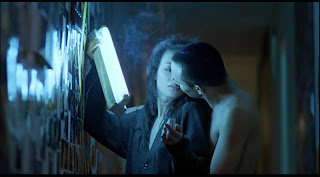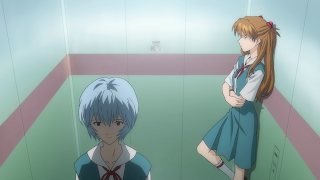This "review" is spoiler-free until the point I add the actual spoiler warning.
ABC's TV show Lost began airing in 2004. My first glimpse of the show was in 2005 when its pilot was aired on Finnish TV for the first time. Its premise was interesting enough for me: a bunch of castaways being stuck on a mysterious island that kept revealing new secrets all the time. I found interesting characters and the flashbacks to their background stories made the show a particularly rich experience. Lost caught me at a time when I had just got into movies more seriously - even though back then I was a helpless newbie.
I became a hardcore fan of the show almost instantly. I bought the DVD boxes and rewatched the episodes countless times. I was initially intrigued by the mysteries and I spent time a lot of time reading theories and giving my own input to them in a fan community. I admired the show blindly for the first three seasons, but my exploration of cinema eventually opened my eyes. At some point during the first half of the 4th season I realised that the series' writing was rather faulty. After the wonderfully character-centric first season that teased us with mysteries, the second and third seasons had an unforgivable amount of filler episodes, frozen character development and more ridiculous mysteries. But then I thought it was too late to stop so I just kept watching the show and I actually found interesting nuances and details that made me gradually more interested in the show again. The 4th season was a solid effort and I found out that I truly cared about the characters instead of the mysteries - the latter became irrelevant for me.
And that is how I ended up with the opinion I have in regards to the debate whether Lost is character-driven or plot-driven. I have become to hold the plot and mysteries merely as the framework for the characters and themes because the complicated story doesn't work on its own. There are tons of inconsistencies in writing and relying on simple "wow" factor of the mysteries is just cold and dull. And Lost did reward my patience with it because it gradually became better and better. Apart from the messy time travel section of the 5th season it only improved all the time. The series finale was not a disappointment either - it was probably the best 2 hours American TV has ever offered.
Yes, there are plotlines that go nowhere or were treated badly. Yes, there are useless mysteries that were never even addressed afterwards. Yes, most of the characters are rather one-dimensional, but they are still rather fascinating even after 6 seasons (a few of them are utterly terrible though, such as Sayid). And yes, there are only a handful unified themes in the show and some of the motifs remain unused despite repeated use. I don't know what exactly it is among these flaws that makes the show so intriguing - I guess this show is extremely holistic then.
The direction in general is rather messy. The shaky and "edgy" camerawork is dominant in the show and sometimes it is used well, but there are so many times it failed in a miserable way. There are a few notable exceptions when the camera is strictly under control and the results are glorious - the finale is a prime example. The same thing goes for editing as well - there are times when it is terribly random and distracting, but it isn't thoroughly bad. What the show always got right was its set and location design that were simply stunning.
Michael Giacchino's score deserves its own paragraph. Even though it is too sentimental, blatant, heavy-handed and schmaltzy it still works so well. There are times when it is misused or used way too much, but in overall the music keeps the form together. The suspenseful compositions have lesser effect when they are used for pretty much every scene to emphasize a superficially dramatic reveal that is obvious way before we even see it. However, haunting tracks like Life and Death (and the different arrangements of it) prove that Giacchino's score is at its best when it tries to affect your emotions deeply.
From now on there will be spoilers. SPOILER WARNING!
What will I remember about Lost? It will be the characters. You might say that one will naturally develop an emotional bond with the characters after 120 hours, but it's still amazing how the characters are so fascinating and lovable despite the actual character development being so minimal. The show's most tortured characters, Locke and Ben, were the most thoroughly explored characters in the end. Their search for redemption and clarity formed the heart of the show. Then there were great surprises in the last season, surprises which opened the characters for me.
Jack was the character the writers utterly lost after his admirable usage in the first season. However in the last two seasons they created such a clear and affectionate phase of character development as he began to carry the weight of his guilt in different ways. His actions became more and more awesome as the show went on and the logical conclusion was to become the new Jacob - even if it was a brief role that ended with his heroic sacrifice that brought tears to my eyes.
Then there was the comic relief in the form of Hurley and Miles. While Hurley was the lovable genre-savvy character who also had his own drama, Miles was the guy to make cynical remarks that worked surprisingly well on their own. Richard was a mysterious figure for a long time, but once we found about his past he became a tragic character that was even more interesting in the end. Sun & Jin mostly dealt with their own relationship and yet their sweet reunions managed to be touching - and their cruel demise was one of the most heartbreaking moments in the entire show. There was also a bunch of side characters like Frank "forget me for a few episodes" Lapidus that were rather random and useless in the end (or killed off spontaneously like Ilana, that was an epic failure).
The series finale proved me wrong when I thought it couldn't possibly be an emotionally satisfying ending to a show that dragged me along for years. The ultimate moments of redemption and happiness made the show worth watching as the writers showed us just how much they respected and loved the characters as well. And I found it truly incredible that the flash sideways timeline was a sort of an afterlife the main characters had created for themselves - it gave the show a life-affirming tone that enforced the message of "moving on" as Christian Shephard put it. It reminded us fans of the fact that there is a life outside of Lost to which we should return to eventually. I hope I can do that by completing this review. I grew up with the show and even with all of its flaws I can't avoid the fact how much I love it.
Lost (2004-2010): 6 out of 10
The series finale 'The End': 10 out of 10
































 Where this film seriously differs from the original show is its inclusion of a totally new character who - despite appearing as far less complex than the original cast - twists the storyline a lot via her chaotic (and badass) involvement. The already-familiar characters seem to evolve in slightly different paths this time, but I'm not sure if it is going to have an impact in the end since there are still 2 movies to be released. All in all, the writing is nearly as complex as in the original series (which is the ultimate masterpiece of cinema and TV in my opinion) and the film brings new interesting aspects to the characters and the world around them.
Where this film seriously differs from the original show is its inclusion of a totally new character who - despite appearing as far less complex than the original cast - twists the storyline a lot via her chaotic (and badass) involvement. The already-familiar characters seem to evolve in slightly different paths this time, but I'm not sure if it is going to have an impact in the end since there are still 2 movies to be released. All in all, the writing is nearly as complex as in the original series (which is the ultimate masterpiece of cinema and TV in my opinion) and the film brings new interesting aspects to the characters and the world around them.












